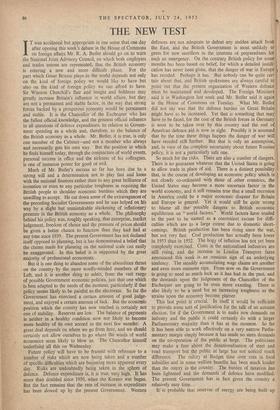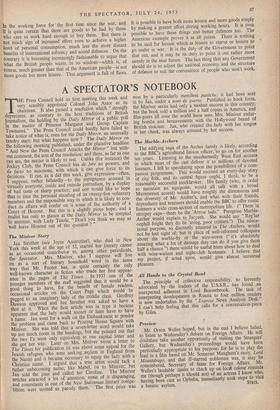THE NEW TEST
IT was accidental but appropriate in one sense that one day after opening this week's debate in the House of Commons on foreign affairs Mr. R. A. Butler should go on to warn the National Joint Advisory Council, on which both employers and trades unions are represented, that the British economy is entering a new and more difficult phase. For the part which Great Britain plays in the world depends not only on the kind of foreign policy we would like to have but also on the kind of foreign policy we can afford to have. Sir Winston Churchill's flair and insight and boldness may greatly increase Britain's influence in world affairs, but they are not a permanent and stable factor, in the way that strong forces backed by a prosperous economy would be permanent and stable. It is the Chancellor of the Exchequer who has the fullest official knowledge, and the greatest official influence in all questions of defence expenditure, its relation to Govern- ment spending as a whole and, therefore, to the balance of the British economy as a whole. Mr. Butler, it is true, is only one member of the Cabinet—and not a member who always and necessarily gets his own way. But the position in which he finds himself today, through the conjuncture of world events, personal success in office and the sickness of his colleagues, is one of immense power for good or evil.
Much of Mr. Butler's success so far has been due to a strong will and a determination not to play fast and loose with the national finances rather than to any great brilliance of invention or even to any particular toughness in requiring the British people to shoulder economic burdens which they are unwilling to accept. He cut down some of the extravagances of the preceding Socialist' Governments and he was helped on his way by a slight but unmistakable slackening of inflationary pressure in the British economy as a whole. The philosophy behind his policy was, roughly speaking, that enterprise, market judgement, freedom of choice and the pressure of prices should be given a better chance to function than they had- had at any time since 1939. The present Government has not declared itself opposed to planning, but it has demonstrated a belief that the claims made for planning on the national scale can easily be exaggerated. In this belief it is supported by the great majority of professional economists.
But it is one thing to abandon some of the absurdities thrust on the country by the more woolly-minded members of the Left, and it is another thing to select, from the vast range of possible Government economic policies, just that one which is best adapted to the needs of the moment, particularly if that policy seems likely to be painful, to the electorate. So far the Government has exercised a certain amount of good judge- ment, and enjoyed a certain amount of luck. But the economic position which the country has now reached is certainly not one of stability. Reserves are low. The balance of payments is neither in .a healthy condition now nor likely to become more healthy of its own accord in the next few months: A great deal depends on where we go from here, and we should certainly not allow ourselves to go where the winds of world economics seem likely to blow us. The Chancellor himself underlined all this on Wednesday.
Future policy will have to be framed with reference to a number of risks which are now being taken and a number of specific difficulties which are becoming more apparent every day. Risks are undoubtedly beirig taken in the sphere of defence. Defence expenditure is, it is true, very high. It has more than doubled since 1950, when the Korean war began. But the fact remains that the rate of increase in expenditure has been slowed up by the present Government. Western defences are not adequate to defeat any sudden attack from the East, and the British Government is most unlikely to press for new sacrifices in the interests of preparedness for such an emergency. On the contrary British policy for some months has been based on belief, for which a detailed justifi- cation has never been given, that the danger of war in Europe has receded. Perhaps it has. But nobody can be quite cer- tain about that, and British spokesmen are always careful to point out that the present organisation of Western defence must be maintained and developed. The Foreign Ministers said it in Washington last week and Mr. Butler said it again in the House of Commons on Tuesday. What Mr. Butler did not say was that the defence burden on Great Britain might have to be increased. Yet that is something that may have to be faced, for the cost of the British forces in Germany is soon to be taken over by this country and the end of American defence aid is now in sight. Possibly it is assumed that by the time these things happen the danger of war will have receded still further. But that is only an assumption, and, in view of the complete uncertainty about future Russian policy, it is not a particularly safe one.
So much for the risks. There are also a number of dangers. There is no guarantee whatever that the United States is going to allow trade in place of aid. There is a distinct possibility that, in the course of developing an economic policy which is not closely co-ordinated with those of other countries, the United States may become a more uncertain factor in the world economy, and it still remains true that a small recession in America could be a major economic disaster for Britain and Europe in general. Yet it would still be quite wrong to blame all the possible dangers to British economic equilibrium on " world factors." World factors have tended in the past to be named as & convenient excuse for diffi- culties which are to a large extent due to domestic short-, comings. British production has been rising since the war, but not very fast. Coal production has actually been lower in 1953 than in 1952. The bogy of inflation has not yet been completely exorcised. Costs in the nationalised industries are still rising, and the increase in London Transport fares announced this week is an omnious sign of an underlying tendency. The steadily accumulating wage claims are another and even more ominous sign. From now on the Government is going to need as much luck as it has had in the past, and the demands upon the judgement of the Chancellor of. the Exchequer are going to be even more exacting. There is also likely to be a need for an increasing toughness as the strains upon the economy become plainer.
This last point is crucial. In itself it would be sufficieht to provide some sort of justification fqr the talk' of an autumn election; for and the Government is to make new demands on industry and the public it could certainly do with a larger Parliamentary majority than it has at the moment. So far it has been able to work effectively on a very narrow Parlia- mentary margin simply because it has made no stern demands on the co-operation of the public at large. The politicians may make a fuss about the denationalisation of steel and road transport but the public at large has not noticed much difference. The outcry at Budget time over cuts in food subsidies and in some welfare benefits has been much louder than the outcry in the country. The burden of taxation has been lightened and the demands of defence have modified. The present Government has in fact given the country a relatively easy time. , It' is probable that reserves of energy are being built up In the working force for the first time since the war, and it is quite certain that there are goods to be had by those who care to work hard enough to buy them. But there is not much sign of increased effort even to achieve a higher level of personal consumption, much less the more distant benefits of international solvency and sound defences. On the contrary it is becoming increasingly fashionable to argue that what the British people wants, in its wisdom—whith is, of course, much greater than that of the American people—is not more goods but more leisure. That Argument is full of flaws. It is possible to have both more leisure and more goods simply by making a greater effort during working hours. It is even possible to have these things and better. defences too. The American example proves it at all points. There is nothing to be said for leisure which is leisure to starve or leisure to go under in war. It is the duty of the Government ,to point that out, and it may be its duty to point it out rather more sternly in the near future. The last thing that any Government should do is to adjust the national economy and the structure of defence to suit the convenience of people who won't work.



























 Previous page
Previous page